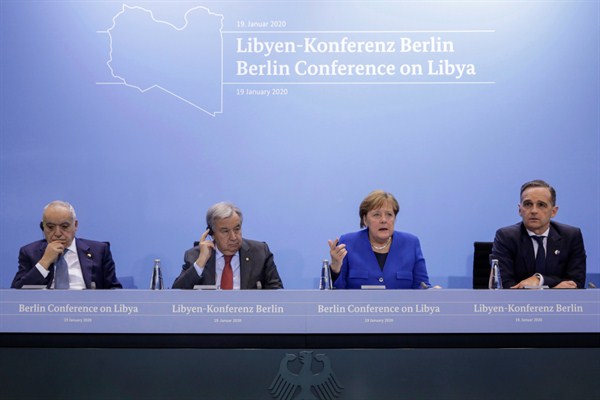At a recent conference in Berlin, more than a dozen outside powers, including Russia and Turkey, pledged to stop interfering in Libya’s civil war and respect the terms of a shaky cease-fire and a United Nations-imposed arms embargo. But just days after the meeting in Berlin, the U.N. warned that foreign materiel and personnel were continuing to flow into the country. The fragile truce that was first declared on Jan. 12 has now collapsed, as fierce fighting resumed in Libya this week between breakaway Libyan militia commander Khalifa Haftar’s forces and the U.N.-backed government in Tripoli.
Fueled by increasing foreign involvement, Libya’s civil war has been fully internationalized. It all goes back to Haftar’s decision to launch a major offensive to capture Tripoli last spring, which irreversibly altered the geopolitical landscape of a conflict that fully erupted in 2014. Despite backing from a motley crew of foreign powers including France, Egypt, the United Arab Emirates and Russia, Haftar’s forces, widely known as the Libyan National Army, met a fierce groundswell of resistance from rival militias that mobilized to support the Tripoli government, which is receiving military aid from Turkey. The fighting has remained intense, but without significant territorial gains for either side.
From the beginning, Haftar’s offensive relied on periodic deliveries of Russian-printed Libyan banknotes, foreign-supplied heavy weaponry, Emirati-operated drones, and thousands of Sudanese and Chadian mercenaries. But the internationalization of the conflict intensified last summer, after Turkey intervened on behalf of the Tripoli government, known as the Government of National Accord, or GNA. Aided by Turkish heavy weaponry and drones, the GNA stalled Haftar’s offensive and seized his main forward base in the town of Gharyan, just south of Tripoli, in late June. Russia perceived this setback as an opportunity to step up its support for Haftar, deploying soldiers from the Wagner Group, a Kremlin-linked mercenary firm, as Emirati forces responded with more airstrikes.

